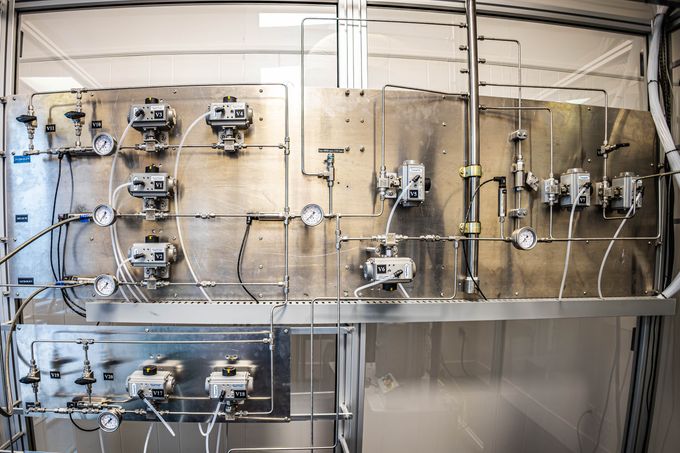Hawaii-based tech company opens new lab in Houston to enhance hydrogen pipeline safety
HOU-DRYGEN
An innovative Hawaii-based technology company is saying aloha to Houston with the opening of a unique test laboratory that aims to increase hydrogen pipeline safety. It is the latest sign that Houston is at the forefront of the movement to hydrogen energy.
The lab, H2XCEL — short for “Hydrogen Accelerator” — aims to integrate hydrogen into the current energy infrastructure, a serious cost-saver for companies looking to make the energy transition. Oceanit, a Honolulu-based technology company, is behind the lab.
H2XCEL will be the only lab in the U.S. capable of testing hydrogen and methane mixtures at high temperatures and pressures. Its aim is to protect pipelines from hydrogen embrittlement — when small hydrogen molecules penetrate pipe walls and damage the metal, potentially causing cracks, leaks, and failures.

Photo courtesy of Oceanit
“The launch of this testing facility is a major milestone. It is the only lab of its kind in the U.S. and the work underway at H2XCEL will accelerate the transition toward a hydrogen-driven economy,” Patrick Sullivan, the CEO and founder of Oceanit, says in a news release. “We see a toolset emerging that will enable the U.S. to accelerate toward a low-carbon future.”
Houston was the obvious choice to launch the new lab, says Oceanit’s Direct of Marketing James Andrews.
“Houston is the energy capital of the world," Andrews explains. "Oceanit knew that if we wanted to make inroads with decarbonization technologies, we needed to be physically present there.”
H2XCEL uses Oceanit’s HydroPel pipeline nanotechnology, developed with the support of the U.S. Department of Energy. It is a surface treatment that protects metals, eliminating the need to build new pipelines using expensive, hydrogen-resistant metals. The estimated cost of building new hydrogen pipelines is approximately $4.65 million per mile, according to a press release from the company. In contrast, HydroPel can be applied to existing pipelines to prevent damage, and the cost to refurbish one mile of existing steel pipeline is less than 10 percent of the cost per mile for new pipeline construction.
One of the main objectives of the new Houston lab will be to test hydrogen-methane blends under varying conditions to determine how to use HydroPel safely. By enabling the energy sector to reduce its climate impact while continuing to provide energy using existing infrastructure, methane-hydrogen blends capitalize on hydrogen’s carbon-free energy potential and its positive impact on climate change.
“We want to create a situation where we can speed up energy transition,” says Andrews. “By blending it into a safer environment, we can make it attractive to bigger players.”
Oceanit already has a Houston presence where the team is focused on several other technologies related to hydrogen, including HeatX, a water-based technology for heat transfer surfaces in refineries, power plants, and more, as well as their HALO system, which utilizes directed energy to produce clean hydrogen wastewater and other waste byproducts produced in industrial businesses.
A recent report issued by Rice University’s Baker Institute for Public Policy about the hydrogen economyin Texas insists that the Lone Star State is an ideal hub for hydrogen as an energy source. The report explains that with the state’s existing oil and gas infrastructure, Texas is the best spot to affordably develop hydrogen while managing economic challenges. The Houston region already produces and consumes a third of the nation’s hydrogen, according to the report, and has more than 50 percent of the country’s dedicated hydrogen pipelines.
------
This article originally ran on EnergyCapital.

 Apple doubles down on Houston with new production facility, training center Photo courtesy Apple.
Apple doubles down on Houston with new production facility, training center Photo courtesy Apple.